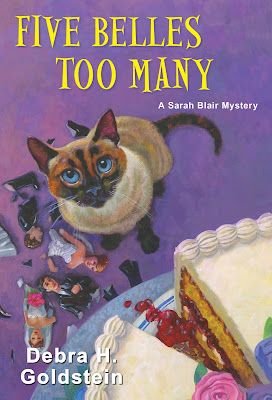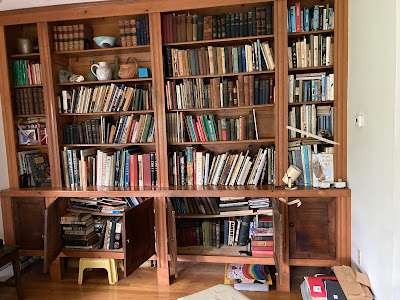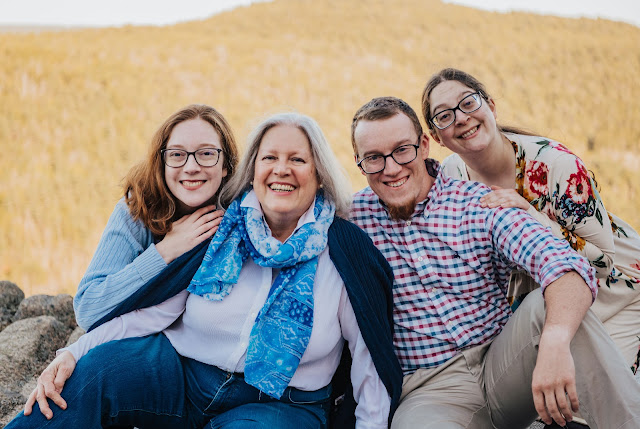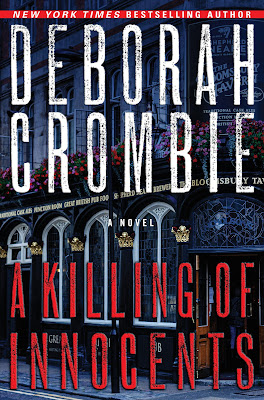HALLIE EPHRON: It's a very happy day indeed when we get to welcome the lovely and talented (and funny an super-nice...) Barbara Ross to Jungle Red with a new book - the tenth in her delicious Maine Clambake Mystery Series, MUDDLED THROUGH. The series is great fun and you can't find a more authentic Maine experience, short of being there.
Welcome Barbara!
BARBARA ROSS: Hi Reds and Reds-readers! I am so happy to be here. Many of you will already know that several Reds have been friends and mentors to me over the years, especially the New England crew. Lucy and I share a birthday (same year, one week apart) so we celebrate together in Key West. This year we celebrated our January birthdays in March due to babies who arrived later than expected, covid, and the general messiness.
My latest book, released Tuesday, is Muddled Through, the tenth Maine Clambake Mystery series. One topic while researching for this book, I particularly enjoyed was discovering more about Barbara Cooney and her classic children’s story, Miss Rumphius. In the book, published in 1982, Alice Rumphius tells her grandfather that when she grows up, she will go to faraway places, and when she gets old, she will live in a house by the sea. Her grandfather tells her she must do one additional thing: She must do something to make the world more beautiful.
Alice does go to faraway places. An intrepid, self-directed single woman, she travels around the world. Then she goes back to Maine to live in a house by the sea. Once there, she makes the world more beautiful by dropping lupine seeds wherever she goes.
I based my contemporary character, Alice Rumsford, on Miss Rumphius. My character also travels the world, returns to her family’s cottage on the Maine coast, and endeavors to make her community more beautiful.
Barbara Cooney was born in 1917 in Brooklyn. She went to Smith College, married, had two children, discovered her husband was a “cad” and a “womanizer” and divorced. Her father and brother had disowned her when she married, so she supported her family as a children’s book illustrator. She later remarried, happily, had two more children, and traveled widely to gain inspiration for her art. She won two Caldecott Medals and a National Book Award (for Miss Rumphius). She eventually lived in Damariscotta, Maine, which is, happily, the next town north of my fictional town of Busman’s Harbor.
Cooney almost certainly based the character of Miss Rumphius on Hilda Edwards Hamlin, born in 1889. Hamlin arrived in Christmas Cove, Maine, very near Damariscotta, to visit an uncle in 1904. Like Barbara Cooney, she graduated from Smith College, thought a generation earlier, married, had children, and divorced.
(In perhaps a coincidence, or perhaps an illustration that the world of educated New England WASPs was very small, Barbara Cooney’s second husband was Charles Talbot Porter. Hilda’s ex-husband was Talbot Faulkner Hamlin. In another coincidence, in typing this, I just realized Hamlin must have been at Smith with my grandmother. I will look for her in the yearbook)
Like Miss Rumphius, Hamlin traveled widely and then settled in the little cottage in Christmas Cove. In Maine, she made the world more beautiful by scattering lupine seeds wherever she went. She didn’t drive and neighbors who gave her rides would discover her surreptitiously tossing seeds out their car windows. Yankee magazine ran an article on her in 1971 that included the quote, “If friends of Hilda Hamlin would tote a few sticks of wood to her cottage they would be doubly welcome.” In a later issue, they had to print a plea for people to stop visiting her.
The lupines that Hilda Hamlin seeded are not native to Maine. They come from the west coast. Even though their beauty on roadsides and meadows between Father’s Day and the Fourth of July has come to symbolize Maine, they didn’t start appearing until the 1950s, when Hilda Hamlin was in her sixties. These new lupines have crowded out the more modest local variety and in so doing extirpated the Kargan Blue Butterfly.
The lupines are an excellent metaphor for incomers to Maine. The investment, enterprinse and support for local businesses they bring is welcome, but the non-natives are difficult to cultivate and impossible to contain. The natives worry about being crowded out, swallowed up by the wolves for which the lupines are named.
Dear Reds and Readers: What do you think? Native plants only, or can you beautify the world with non-natives? Feel free to treat the question literally, as a metaphor, or both.
Barbara Ross is the author of the Maine Clambake Mysteries and the Jane Darrowfield Mysteries. Her books have been nominated for multiple Agatha Awards for Best Contemporary Novel and have won the Maine Literary Award for Crime Fiction. Barbara’s Maine Clambake novellas are included along with stories by Leslie Meier and Lee Hollis in holiday anthologies from Kensington Publishing. Barbara and her husband live in Portland, Maine. Readers can visit her website at www.maineclambakemysteries.com



























.png)










